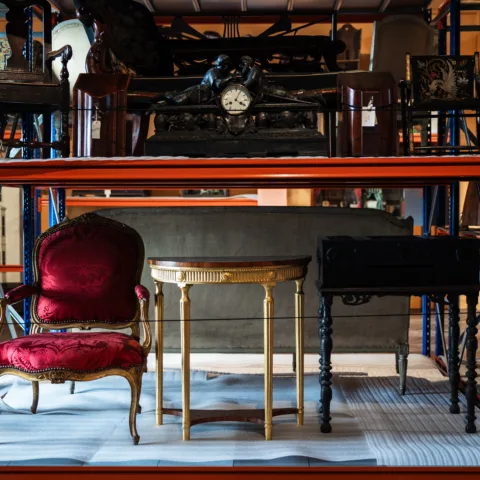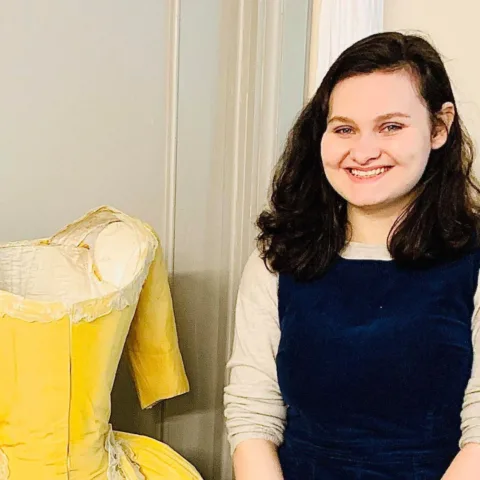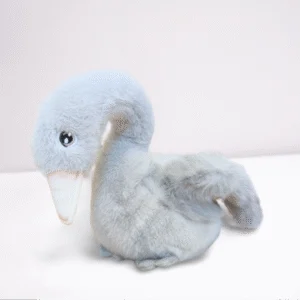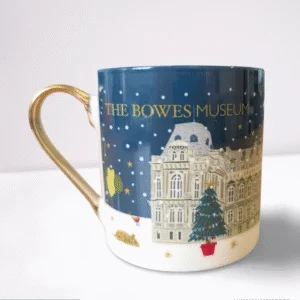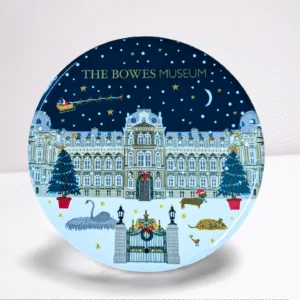The Bowes Museum Blog

John Bowes’ Bells and Whistles by Leyre Quevedo-Bayona #BowesStaff
This year, to celebrate the 125th anniversary of the Museum, the Museum has been hosting exhibitions focused on our founders, John and Josephine Bowes. At the moment, one of the exhibitions celebrating The Bowes’s legacy is Streatlam Castle: Rediscover The Home Of John And Josephine Bowes exhibition.
For this special occasion, we have been busy in the Textile Conservation Department taking care of a number of unique objects, masonic and military regalia, that belonged to John Bowes himself!
These objects include a Masonic apron and matching sash, a white silk masonic emblem and matching medal, a military insignia, a pair of epaulettes and an impressive full dress epaulette.
These objects have been in storage for many years, so they needed a bit of a makeover (or quite a big one in the apron’s case) before making their appearance on public sight, and that’s what we did! It was a team effort, with Cecilia Voss, the Textile Conservator, conserving the tricky apron and me the rest of the special items.
The apron was the biggest conservation job. The first problem was that the leather had shrunk so the silk lining was bigger than the apron. It had also been previously folded into a tiny square so had grid like folds all over it. The second problem was that the entire silk lining had broken down, a result of a combination of insect damage (silk is second only to wool in the tastiness stacks!) and general degradation of the fibres. The leather was too fine to re-stretch so all Cecilia could do was re-shape and then work with the excess silk. The silk was so weak, it couldn’t be stitched and introducing an adhesive would’ve meant it was stuck for life, which goes against our conservation ethics. Therefore it was treated as we would approach an archaeological textile, sandwiching it between a layer of silk and nylon net. It took 50 hours of stitching to go round every single fragment of silk!

Apron front before conservation

Apron front after conservation

Apron back before conservation

Apron back after conservation
It was then mounted on a custom-made board so it doesn’t ever need to be handled, a risk of undoing all of Cecilia’s lovely stitching!
The rest of the objects were in better condition. The main damage they presented was creasing and distortion, mostly in the epaulettes ties and in the sash, along with general soiling and metal tarnish. Therefore, the main treatments carried out were cleaning and aligning.
To clean the surface of these objects we used a special museum hoover with low suction and special appliances that allows us to remove the dust of the surface without removing original material, and a chemical sponge in those areas where the soiling seemed to be sitting between the fibres and not just on top of them.
On the metal bits, I used a mixture of solvents to get rid of the tarnish layer and to remove the soiling that covered certain areas.
Aligning was the last step, applying humidity through a semi-permeable membrane I managed to make the textile flexible enough to slightly reshape it, without applying any moisture directly on the object, since that could cause dye bleeding and other problems that we try to avoid by all means!

One of the ties belonging to the pair of epaulettes, before and after aligning it. Next to it, the back of the epaulette, before and after the conservation treatment
As an anecdote, I aligned the fringe on the sash on a Friday, and when I came back to work on Monday, it looked exactly as it did at the beginning! I decided to teach that fringe a lesson! I secured each one of the threads to a nylon net placed in the back of said fringe, using a really fine matching colour polyester thread, so it is invisible to the naked eye. That will keep them in their place!

The fringe, before and after conservation. Can you see the threads or the net in the second picture? No? I told you!
“Streatlam Castle: Rediscover The Home Of John And Josephine Bowes” will be open between the 25th of November untill the 11th of March 2018, don’t miss it!

Leyre with Josephine Bowes’s bodice that she restored and the custom made skirt in “Josephine a Woman of Fashion” exhibition
Blog written by Leyre Quevedo-Bayona ICON* intern in the Conservation Department at The Bowes Museum . She has joined us from Spain where she completed an undergraduate degree at Escuela de Arte y Superior de Conservacion y Restauracion de Bienes Culturales “Mariano Timon” in Palencia specialising in textiles.
If you want to read more about Leyre follow the link: The New Textile Conservation Department.
Follow our Conservation Department on Twitter at: @bowesconserves
* The Institute of Conservation
